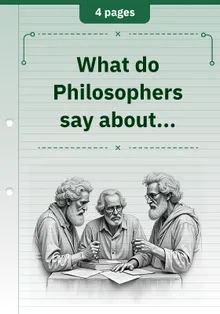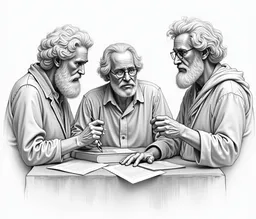
What do Philosophers say about...
Objective: This worksheet aims to provide students with a foundational understanding of a philosophical concept by exploring various philosophical perspectives. It encourages students to critically examine how different thinkers define the philosophical idea.
Content and methods: The material introduces the general essence of the philosophical idea. It then presents concise summaries of five major philosophical views. Methodologically, the worksheet uses informational texts followed by multiple-choice comprehension questions to assess understanding. Finally, it prompts students to perform independent research and write a response statement to one philosopher's teachings.
Competencies:
- Reading Comprehension: Extracting specific philosophical arguments from introductory texts
- Philosophical Literacy: Understanding and distinguishing between theories
- Research and Argumentation: Conducting further inquiry and articulating a personal stance on a chosen philosophical perspective
Target group: Grades 10-12
55 other teachers use this template
Target group and level
Grades 10-12
Subjects
What do Philosophers say about...

But first, a look at the topic we're exploring today
The Essence of Identity
Identity is the unique combination of characteristics, beliefs, and experiences that define who a person is. It's shaped by various factors including culture, family, friends, and personal experiences. Identity influences how individuals see themselves and how they are perceived by others. It evolves over time as people grow and encounter new life experiences. Understanding one's identity is crucial for personal development and self-awareness, offering a sense of belonging and purpose in the world. In essence, identity is the core of what makes each person distinct and uniquely valuable.

Philosophical Perspectives on Identity
Identity is the unique combination of characteristics, beliefs, and experiences that define who a person is. Philosophers have long debated the nature of identity and personal identity, leading to various perspectives. Here are the views of five notable philosophers on the topic of identity:
David Hume:
- Hume famously questioned the existence of a permanent self. According to his bundle theory, the self is nothing but a collection of perceptions. He argued that we have no evidence of a consistent self because all we experience are fleeting sensations and thoughts. For Hume, what we consider to be the self is just a bundle of different perceptions linked by memory and causation.
Derek Parfit:
- Parfit took a reductionist view of personal identity, suggesting that identity is not what matters in survival. Instead, he proposed that psychological continuity and connectedness (what he called Relation R) are what truly matter. Parfit used thought experiments, like the teletransportation paradox, to illustrate his point that personal identity is less significant than psychological continuity.
John Locke:
- Locke's theory of personal identity is grounded in consciousness. He argued that personal identity is based on the continuity of consciousness, particularly memory. For Locke, a person remains the same over time as long as they can remember their past actions and experiences, making memory the key to personal identity.
Immanuel Kant:
- Kant proposed that the self is a necessary condition for experiences. He argued that for experiences to be unified and coherent, there must be a self that organizes these experiences. This self is not a substance or an object but rather a function of the mind that synthesizes experiences according to certain principles.
Gottfried Wilhelm Leibniz:
- Leibniz introduced the concept of identity of indiscernibles, which states that if two entities share all the same properties, they are identical. He also discussed the idea of personal identity in the context of the monadology, where each monad (a simple, indivisible substance) has a unique identity and history, defined by its perceptions and appetitions.
These philosophers' perspectives offer a rich and diverse understanding of identity, ranging from the empirical skepticism of Hume to the psychological continuity emphasized by Parfit and Locke. Each provides a unique lens through which to examine the essence of what makes us who we are.
